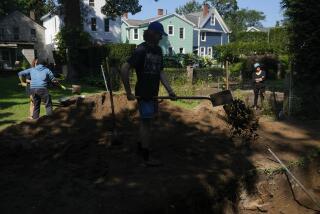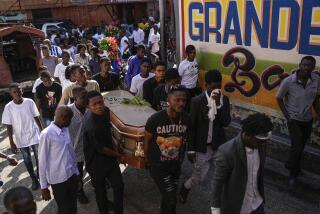Search for Body Yields Lessons for Students
- Share via
ST. GEORGE'S, Grenada — The yearlong body hunt is over for Andre Bierzinski, Valentino Sawney Jr. and the 42 other Young Leaders of 2000.
When the two 16-year-olds and their classmates head back to school next week for their final year at the Presentation Brothers College prep school here, pathology, forensics and the case Bierzinski calls “Grenada’s X-Files” will be replaced by basic chemistry, biology and advanced math.
And the mystery that has scarred the Grenadian soul for nearly two decades will now fall on the slight frame of the boys’ soft-spoken headmaster, Robert Fanovich, the 38-year-old Roman Catholic brother who inspired and guided the boys in their quest for truth and peace.
It was a most unusual class project, to be sure: searching the present and past to find the body of former Grenadian Prime Minister Maurice Bishop, whose Oct. 19, 1983, execution along with 18 members of his revolutionary government helped trigger the U.S. military invasion of this Caribbean island just six days later.
It was also controversial: His executioners burned and hid Bishop’s body along with eight others--and, many here believe, the Americans unearthed and reburied the remains--to keep the charismatic leader from becoming as powerful in death as he was until the coup in which he was killed.
The coup-makers remain in jail here, serving life sentences for ordering the killings. And for a nation long in denial, the boys’ project became something of an epiphanic wake-up call.
“Our project’s aim was to bring peace to the suffering families as a first step in the healing of our nation,” the boys explained in their thick, bound final report.
“We believe that if the families knew what happened to their loved ones, then there could be a closure to this terrible chapter in their lives and, indeed, our history,” the report said.
But when the boys got a bit too close to the truth early this year--after their investigation led to three U.S. Army body bags in an unmarked grave in St. George’s Cemetery--the discovery reopened wounds. Their project spawned political sparring between pro- and anti-Bishop factions, and, the boys agree, it taught them lessons both painful and profound.
“Our project took us where we would have preferred not to go,” said their final report, which earned them second place in a competition of class projects among Caribbean prep schools. “We came face to face with the beast in human nature. Murder, deceit, fear, lies and a pain that comes from not knowing the facts. But we also saw some of the best in human nature.”
Led by Bierzinski and Sawney, the boys spent most of the year befriending prisoners, politicians, former soldiers, undertakers, gravediggers and relatives of the dead.
They also scoured documents, unearthing a Dec. 12, 1983, report by the U.S. Armed Forces Institute of Pathology, which confirmed that the United States sent a team to Grenada to try to identify Bishop’s remains. (U.S. officials deny that the invasion force tried to hide them.)
The class interviewed witnesses to the killings. And they tracked down the body bags, which contained skeletons that a team of U.S. and British forensic experts called in to investigate in April have concluded were not Bishop’s bones, Fanovich said this week.
Reflecting over a couple of sodas at a local mini-mall as they ended their summer vacation this week, Bierzinski and Sawney said they think they would have won the competition had the subject matter been less controversial.
“A lot of people thought it was not an appropriate topic for boys our age,” Bierzinski said. “But I still think they were wrong. It was fun. It was shocking. And it was a great education. I learned more about my country in the past year than I could doing anything else.”
Sawney added: “The idea was to bring peace to the families, to bring peace between those who are in prison and those whose bodies are still missing. And we didn’t really succeed in that. But as a lesson in personal self-motivation, it was amazing.”
And Fanovich, who has been criticized both from within the Catholic Church and outside it, said: “No regrets whatsoever.
“I have seen these boys growing--becoming more analytical and more critical in their thinking. I think they have learned a lot about human nature--the best of it and the worst of it.”
The Trinidadian-born Fanovich said he will continue on his own to pursue leads in the body search. As for the year ahead, however, the project chosen for Young Leaders of 2001 promises to be no less controversial.
Next year’s task: seeking to persuade the owner of Grenada’s uninhabited Large Island, which is home to a species of rare tortoise, to develop it for eco-tourism rather than rent it for $10,000 a year to a U.S. developer planning to build villas there.
More to Read
Sign up for Essential California
The most important California stories and recommendations in your inbox every morning.
You may occasionally receive promotional content from the Los Angeles Times.













